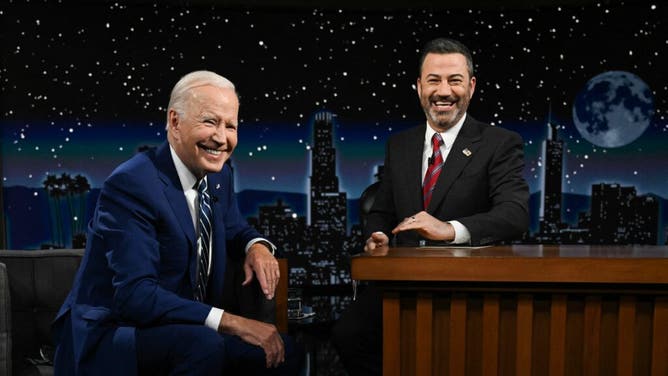Writers Strike Kept Jimmy Kimmel From Retiring, But How Long Will ABC Want Him?
The ongoing Writers Strike may keep Jimmy Kimmel from retiring.
Kimmel told guests on his limited podcast series "Strike Force Five" that he planned to retire before his nightly program went into hiatus last May but has since realized he doesn't so much care for the pseudo-retirement life.
“I was very intent on retiring right around the time where the strike started,” Kimmel said.
“C’mon, you are the Tom Brady of late night…you have feigned retirement…. Are we to take you at your word," asked fellow late-night host Seth Meyers.
“I was serious, I was very, very serious," responded Kimmel.
Kimmel frequently teases retirement, then re-signs for a more lucrative deal with more days off.
In fact, he just signed a three-year extension last September. Meaning, he contemplated retirement nine months after signing a new contract.
Kimmel wants to be wanted. Fifteen million a year and summers off are enough for him to stick around. He needs his bosses and fans and celebrity friends to continuously reassure him that he matters.
However, he has never mattered less than he does today.
Late-night is not the monoculture cash cow it was when Jimmy Kimmel started some 20 years ago. Or even five years ago.
In 2018, late-night drew more than $698 million in advertising revenue. Last year, the same seven shows across ABC, NBC, and CBS totaled $412.7 million, a 41% drop over five years.
Networks could decide to replace Kimmel and Jimmy Fallon with younger, cheaper hosts as a result.
Those are the consequences of waving goodbye to half of the country.

US President Joe Biden sits next to host Jimmy Kimmel as he makes his first in-person appearance on "Jimmy Kimmel Live!" during his Los Angeles visit to attend the Summit of the Americas, in Hollywood, California, June 8, 2022. (Photo by Jim WATSON / AFP) (Photo by JIM WATSON/AFP via Getty Images)
Specifically, Kimmel has struggled to keep pace in the ratings for late-night supremacy. Stephen Colbert is now the top-rated host in late-night every quarter of the year.
While Colbert isn't funny either, the politicization of the late night has better suited Colbert compared to his rivals, two guys named Jimmy.
And if the Disney-owned ABC cannot rebound in the ratings, it might take joy in being the first network to replace a white man with a person of color. Critics have long accused the genre of being too white and male, and therefore racist.
Perhaps that's where Stephen A. Smith comes in.
Smith, already an employee of Disney, has openly campaigned for a late-night program. Smith says he will inquire about said opportunities when his deal expires in 2024, around the same time as Kimmel's.
Stephen A. filled in for Kimmel on ABC two summers ago.
It would be quite ironic if, after years of threatening to retire, Kimmel is the latest DEI causality at Disney.
That's if ABC continues to invest in late-night at all.
Already, CBS eliminated "The Late Late Show" in favor of a reboot of a Comedy Central game show. NBC has discussed moving "Late Night with Seth Meyers" to its sister station, MSNBC. And TBS removed itself from late-night programming last year.
ABC might also prefer to air more cost-effective programming at night, at Kimmel's expense. Retirement is not always a choice.